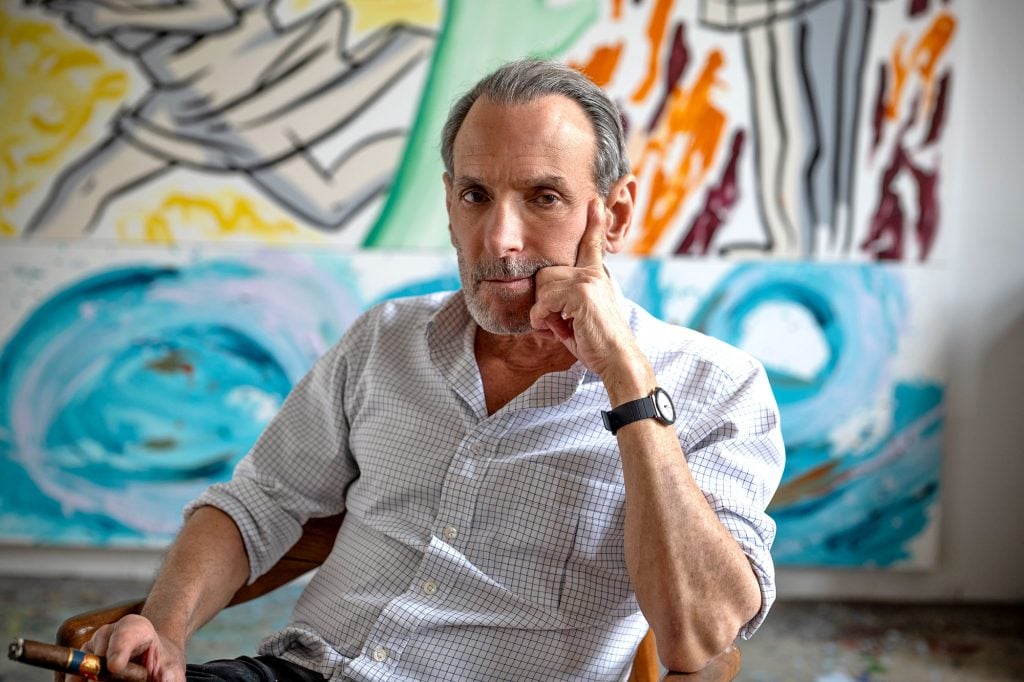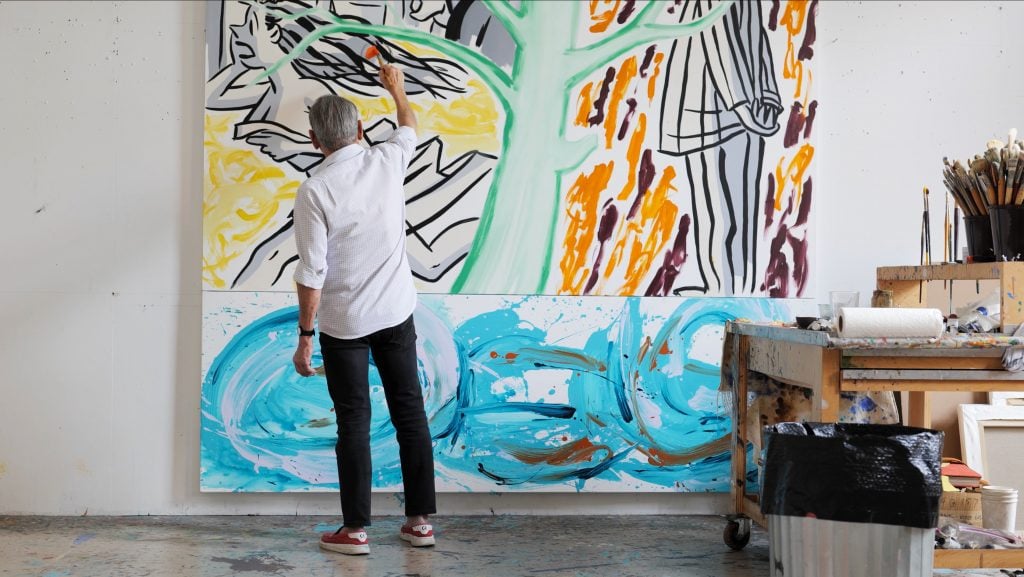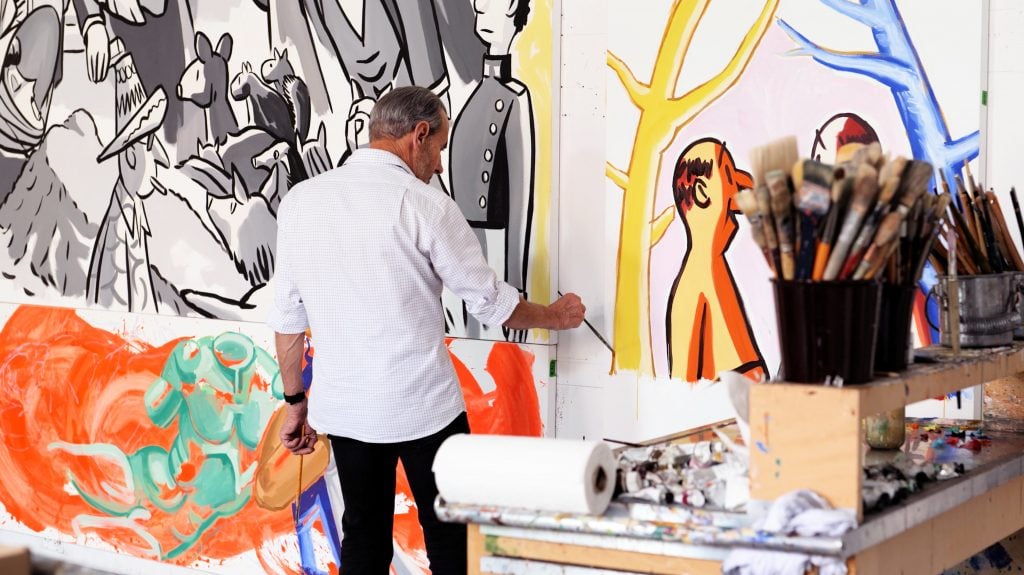Studio Visit
In His East Hampton Studio, Painter David Salle Starts His Days Searching for Artistic Transformation and Ends Them With a Cold Beer
The artist's current exhibition, "World People," is on view at Lehmann Maupin in Seoul, South Korea.

The artist's current exhibition, "World People," is on view at Lehmann Maupin in Seoul, South Korea.

Katie White

David Salle likens his studio practice to that of a novelist. He comes in in the mornings and “reads” over what he’s accomplished the day before. Then he sets to work anew.
Every day in the studio for Salle is a little bit different, though, the artist says, he likes to wrap his days the same way: with a cold beer. Salle, who splits his practice between his longstanding studios in Manhattan and East Hampton, has spent his summer putting the final touches on his new exhibition “World People” at Lehmann Maupin, Seoul, which opened earlier this week and is on view through October 28, 2023.
The anticipated new exhibition—Salle’s second with the gallery in South Korea—presents the Pictures Generation artist’s newest, and final, installment of his “Tree of Life” series. In these works, Salle juxtaposes imagery pulled from the Garden of Eden, namely the Tree of Life, with all its moralistic connotations, with Mad Men-esque cartoon characters inspired by the work of illustrator Peter Arno, whose mid-century cartoons appeared on over 100 covers of The New Yorker.
The proverbial Tree of Life—painted in various brightly colored hues—bisects each of these uncanny new compositions, positioning breezy and effete Manhattanites on either side of its ancient branches. The lower panels of the paintings, meanwhile, often offer counterpointing, almost abstract vignettes. Characteristically for Salle, the paintings are rhythmic, marked by gestural passages, while touching the religious, philosophical, and mythological traditions that underpin the history of art and its continued creation. “I’m staging little dramas,” the artist told the gallery of these works; the dramas are hinted at but never revealed, leaving viewers to make their own connections.
Recently, we caught up with Salle at his light-filled East Hampton studio where he told us about the paintbrushes he can’t do without, a gift from Urs Fischer that he uses as a paperweight, and his straightforward, but unpredictable approach to art-making.
Tell us about your studio. Where is it, how did you find it, what kind of space is it, etc.?
The studio I’m working in now is in East Hampton. It was designed by my friend Joe D’Urso, who drew it on a napkin one day after lunch. Joe is brilliant; the proportions are perfect, the light is great, and the doors are very tall. There’s a large awning window at one end that looks out onto a pond and the fields beyond. The ceilings are 15 feet clear. When Joe proposed that height I thought he was crazy, but he convinced me that I would like it once the space was built. Of course, he was right.
Do you have studio assistants or other team members working with you? What do they do?
My assistant generally runs errands and washes brushes. It’s not terribly interesting work—changing light bulbs and keeping up with the flow of brushes. In recompense, we try to have a nice lunch outside under the arbor at least occasionally.

David Salle in his studio, 2023. Photo: Frenel Morris © David Salle/VAGA at Artists Rights Society (ARS), New York. Courtesy of the artist and Lehmann Maupin, New York, Hong Kong, Seoul, and London.
How many hours do you typically spend in the studio, what time of day do you feel most productive, and what activities fill the majority of that time?
Every day is somewhat different, but the real work often gets underway in the afternoon and continues through the evening.
What is the first thing you do when you walk into your studio (after turning on the lights)?
The skylights here mean I seldom have to turn the lights on. The first thing I do is react to what’s here—to what I did the day before—sort of like a novelist reading over the pages they wrote the previous day.
What is a studio task on your agenda this week that you are most looking forward to?
Finishing a painting. My pictures are the result of a sometimes quite lengthy process—not exactly groping in the dark, but close. You try to find what the “thing” is that’s going to be transformative, and it can be elusive. It’s like finding the meaning of a scene for a director—sometimes it only comes after you’ve been working for a while. It comes out of the doing. But it’s highly unpredictable, so finishing a picture or a group of pictures is an occasion for a quiet celebration.
What tool or art supply do you enjoy working with the most, and why?
Very long, soft, springy natural hair brushes—pliant to the point of being hard to control.
How do you know when an artwork you are working on is clicking? How do you know when an artwork you are working on is a dud?
Well, that’s the question, isn’t it? If anyone can succinctly answer that question, I’d like to hear it. You feel it, just as you feel its absence.
Do you have any other artist’s work in your studio?
I have a small pink plaster elephant given to me by Urs Fischer that I use as a paperweight.

David Salle in his studio, 2023. Photo: Frenel Morris © David Salle/VAGA at Artists Rights Society (ARS), New York. Courtesy of the artist and Lehmann Maupin, New York, Hong Kong, Seoul, and London.
Is there anything in your studio that a visitor might find surprising?
Not if they’re familiar with the process. It’s pretty straightforward—paint, canvas, brushes. I can hear the reader’s yawn.
What is the fanciest item in your studio? The most humble?
There’s nothing fancy here. I do have a rather nice midcentury pine table and chairs from Sweden—it looks like something by Axel Hjorth, but it cost only a few hundred dollars.
How does your studio environment influence the way you work?
You want a space that focuses your attention—not a space that disperses it.
Describe the space in three adjectives.
Simple, activating, open.
What’s the last thing you do before you leave the studio at the end of the day (besides turning off the lights)?
Think about all that I didn’t accomplish.
What do you like to do right after that?
Have a cold beer.